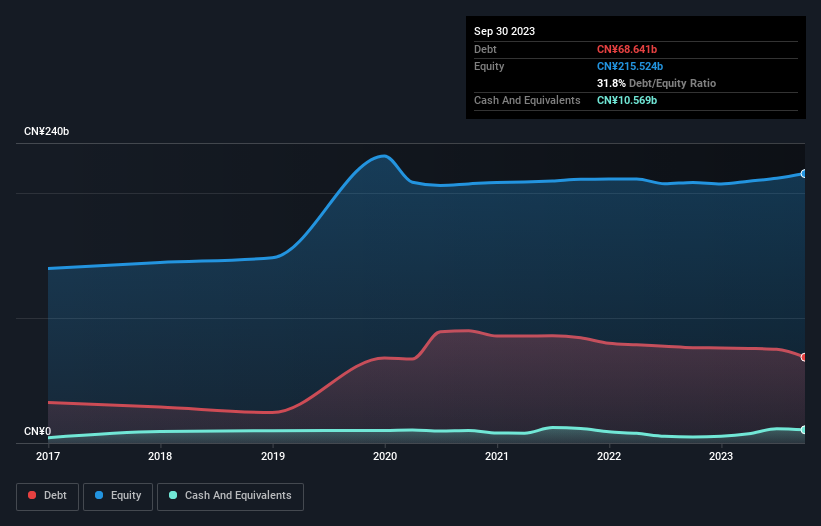- China
- /
- Transportation
- /
- SHSE:601816
Is Beijing-Shanghai High-Speed Railway (SHSE:601816) A Risky Investment?

The external fund manager backed by Berkshire Hathaway's Charlie Munger, Li Lu, makes no bones about it when he says 'The biggest investment risk is not the volatility of prices, but whether you will suffer a permanent loss of capital.' It's only natural to consider a company's balance sheet when you examine how risky it is, since debt is often involved when a business collapses. Importantly, Beijing-Shanghai High-Speed Railway Co., Ltd. (SHSE:601816) does carry debt. But should shareholders be worried about its use of debt?
When Is Debt A Problem?
Debt and other liabilities become risky for a business when it cannot easily fulfill those obligations, either with free cash flow or by raising capital at an attractive price. In the worst case scenario, a company can go bankrupt if it cannot pay its creditors. However, a more usual (but still expensive) situation is where a company must dilute shareholders at a cheap share price simply to get debt under control. Of course, plenty of companies use debt to fund growth, without any negative consequences. The first step when considering a company's debt levels is to consider its cash and debt together.
Check out our latest analysis for Beijing-Shanghai High-Speed Railway
How Much Debt Does Beijing-Shanghai High-Speed Railway Carry?
You can click the graphic below for the historical numbers, but it shows that Beijing-Shanghai High-Speed Railway had CN¥68.6b of debt in September 2023, down from CN¥76.2b, one year before. On the flip side, it has CN¥10.6b in cash leading to net debt of about CN¥58.1b.

A Look At Beijing-Shanghai High-Speed Railway's Liabilities
Zooming in on the latest balance sheet data, we can see that Beijing-Shanghai High-Speed Railway had liabilities of CN¥18.1b due within 12 months and liabilities of CN¥58.8b due beyond that. Offsetting these obligations, it had cash of CN¥10.6b as well as receivables valued at CN¥2.11b due within 12 months. So it has liabilities totalling CN¥64.2b more than its cash and near-term receivables, combined.
Beijing-Shanghai High-Speed Railway has a very large market capitalization of CN¥247.0b, so it could very likely raise cash to ameliorate its balance sheet, if the need arose. But we definitely want to keep our eyes open to indications that its debt is bringing too much risk.
We measure a company's debt load relative to its earnings power by looking at its net debt divided by its earnings before interest, tax, depreciation, and amortization (EBITDA) and by calculating how easily its earnings before interest and tax (EBIT) cover its interest expense (interest cover). The advantage of this approach is that we take into account both the absolute quantum of debt (with net debt to EBITDA) and the actual interest expenses associated with that debt (with its interest cover ratio).
Beijing-Shanghai High-Speed Railway's debt is 3.0 times its EBITDA, and its EBIT cover its interest expense 5.2 times over. This suggests that while the debt levels are significant, we'd stop short of calling them problematic. Notably, Beijing-Shanghai High-Speed Railway's EBIT launched higher than Elon Musk, gaining a whopping 273% on last year. The balance sheet is clearly the area to focus on when you are analysing debt. But it is future earnings, more than anything, that will determine Beijing-Shanghai High-Speed Railway's ability to maintain a healthy balance sheet going forward. So if you're focused on the future you can check out this free report showing analyst profit forecasts.
But our final consideration is also important, because a company cannot pay debt with paper profits; it needs cold hard cash. So it's worth checking how much of that EBIT is backed by free cash flow. Over the last three years, Beijing-Shanghai High-Speed Railway actually produced more free cash flow than EBIT. That sort of strong cash conversion gets us as excited as the crowd when the beat drops at a Daft Punk concert.
Our View
Happily, Beijing-Shanghai High-Speed Railway's impressive conversion of EBIT to free cash flow implies it has the upper hand on its debt. But truth be told we feel its net debt to EBITDA does undermine this impression a bit. When we consider the range of factors above, it looks like Beijing-Shanghai High-Speed Railway is pretty sensible with its use of debt. While that brings some risk, it can also enhance returns for shareholders. Above most other metrics, we think its important to track how fast earnings per share is growing, if at all. If you've also come to that realization, you're in luck, because today you can view this interactive graph of Beijing-Shanghai High-Speed Railway's earnings per share history for free.
At the end of the day, it's often better to focus on companies that are free from net debt. You can access our special list of such companies (all with a track record of profit growth). It's free.
Valuation is complex, but we're here to simplify it.
Discover if Beijing-Shanghai High-Speed Railway might be undervalued or overvalued with our detailed analysis, featuring fair value estimates, potential risks, dividends, insider trades, and its financial condition.
Access Free AnalysisHave feedback on this article? Concerned about the content? Get in touch with us directly. Alternatively, email editorial-team (at) simplywallst.com.
This article by Simply Wall St is general in nature. We provide commentary based on historical data and analyst forecasts only using an unbiased methodology and our articles are not intended to be financial advice. It does not constitute a recommendation to buy or sell any stock, and does not take account of your objectives, or your financial situation. We aim to bring you long-term focused analysis driven by fundamental data. Note that our analysis may not factor in the latest price-sensitive company announcements or qualitative material. Simply Wall St has no position in any stocks mentioned.
About SHSE:601816
Beijing-Shanghai High-Speed Railway
Beijing-Shanghai High-Speed Railway Co., Ltd.
Undervalued with solid track record and pays a dividend.


